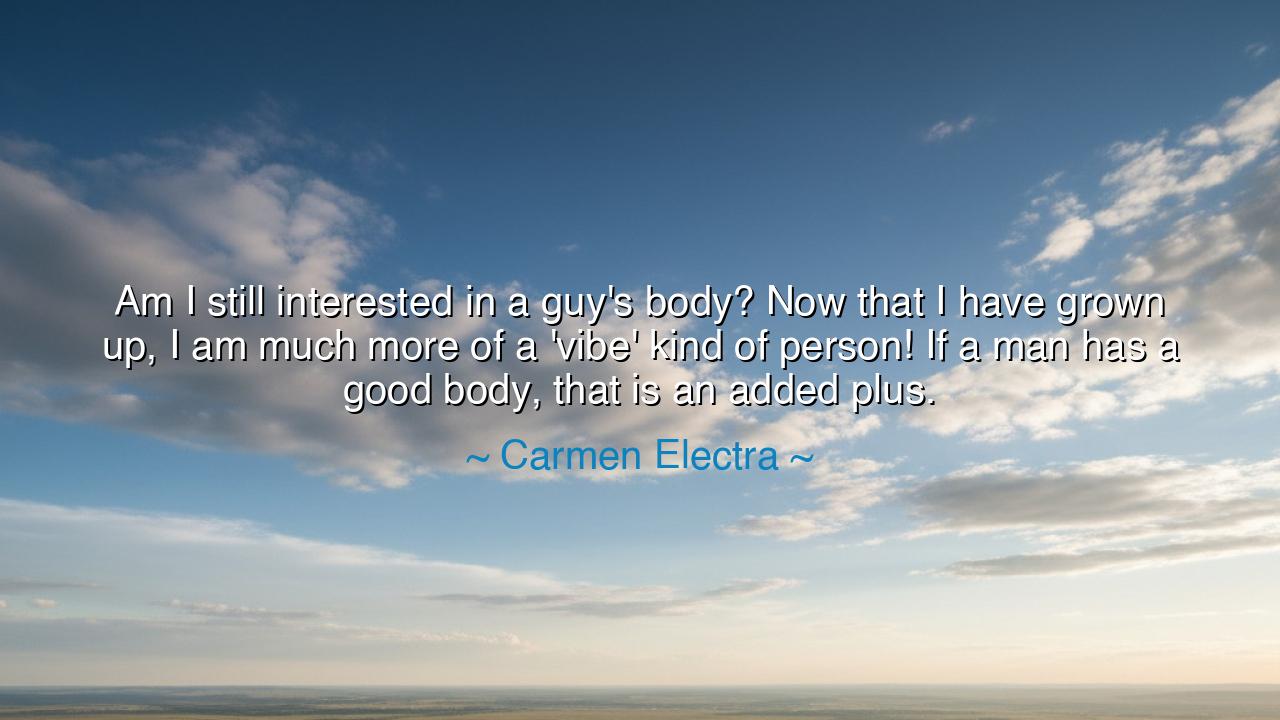
Am I still interested in a guy's body? Now that I have grown up
Am I still interested in a guy's body? Now that I have grown up, I am much more of a 'vibe' kind of person! If a man has a good body, that is an added plus.






“Am I still interested in a guy’s body? Now that I have grown up, I am much more of a ‘vibe’ kind of person! If a man has a good body, that is an added plus.” Thus spoke Carmen Electra, whose life has been lived in the glitter of fame and the gaze of many eyes. Yet beneath this seemingly playful remark lies a truth as old as time—the evolution of desire, the transformation of attraction from the surface to the soul. What begins in youth as a hunger for beauty becomes, with experience, a longing for energy, for presence, for that mysterious essence that cannot be seen but only felt. Her words are not mere preference, but a testament to growth: that as we mature, we learn to seek the vibe, not merely the form—to crave harmony of spirit over perfection of flesh.
In her youth, Carmen Electra was herself the embodiment of physical allure—a symbol of beauty in an age obsessed with appearances. She lived in the world’s spotlight, where the surface was worshiped as substance, and where every glance was a kind of judgment. Yet even she, a woman praised for form, discovered that true connection cannot be sculpted, painted, or posed. A body may draw the eye, but only the vibe, the living rhythm of one’s inner being, can hold the heart. To grow from admiring muscle to sensing soul is not the loss of passion—it is its purification, its refinement into something deeper, more enduring, more divine.
The ancients knew this truth well. The philosopher Plato, in his Symposium, spoke of love as a ladder of ascent. At its first rung, one loves the beauty of bodies; but as one climbs higher, one begins to love the beauty of minds, of virtues, of souls. Finally, one beholds beauty itself—eternal, unseen, perfect. Carmen Electra’s words echo this ancient wisdom in modern form. She too has climbed the ladder—from admiration of form to reverence for essence. When she says she is a “vibe kind of person,” she speaks not of fashion or fleeting mood, but of energy, that invisible harmony between two beings that neither age nor appearance can define.
Consider the story of Cleopatra, the Egyptian queen whose name still stirs the memory of power and allure. The poets of Rome sang of her beauty, yet those who knew her said it was not her looks that captivated the world—it was her presence, her vibe. Julius Caesar and Mark Antony, rulers of empires, bent their wills to hers not because of her face, but because of the aura she carried: intellect, mystery, confidence, grace. The body fades with time; the energy of spirit endures. It is this lesson that Carmen, knowingly or not, passes down: that attraction born of the soul is stronger than any that lives in the flesh.
Her words also hold a mirror to the times in which we live—a world obsessed with image, where filters replace faces and validation is measured in likes. Yet she reminds us that what truly enchants is not what we show, but what we radiate. The vibe is authenticity made visible. It is the warmth of kindness, the light of humor, the serenity of confidence. These cannot be feigned for long; they are born from within, and they attract like stars attract planets—not through force, but through natural gravitation.
But there is wisdom, too, in her playful concession: “If a man has a good body, that is an added plus.” For maturity does not require the denial of beauty—it merely restores it to its rightful place. The body is the temple, but not the god. To appreciate it without worshiping it is balance; to honor it while seeking what lies within is wholeness. Thus, Carmen’s words are not a rejection of youth’s desires, but their reconciliation with wisdom. She celebrates both the visible and the invisible, teaching that harmony comes not from choosing one over the other, but from seeing both as parts of a greater truth.
So, my children of the modern age, take this teaching to heart: seek the vibe, not the veneer. When you look upon another, look not only with your eyes, but with your spirit. Ask yourself not how they appear, but how they make you feel—what energy they bring into your world. Beauty may draw you near, but energy will keep you there. And remember, the vibe you seek in others must also be the vibe you cultivate in yourself. For no heart can attract what it does not already contain.
Thus, Carmen Electra, in her laughter and honesty, reminds us of a sacred truth passed through centuries: that love matures as the soul matures. What begins with admiration ends with understanding. The body may catch the light, but it is the vibe—the living soul within—that carries the fire. So tend to your energy as carefully as you tend to your reflection, and let both shine, not for the world’s applause, but for the one who will one day see your spirit and whisper, “Here, at last, is my home.”






AAdministratorAdministrator
Welcome, honored guests. Please leave a comment, we will respond soon